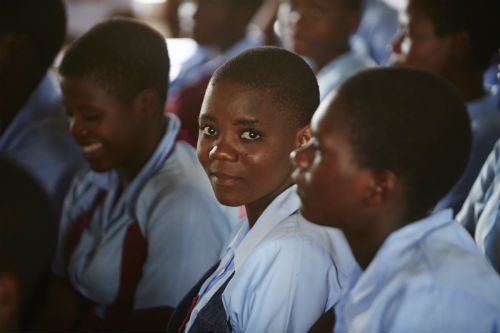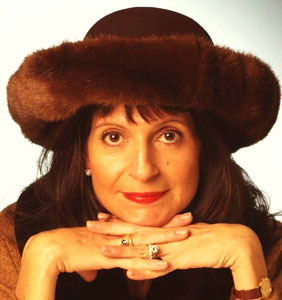In April, I continued my conversations with thought leaders around the world on many topics including the role of standardized testing, global inequality, creativity, and innovation in our world today.
I saw first hand the amazing work that Creative Oklahoma is doing in that state to nurture the arts with schools, business leaders and communities. This is the age of innovation and all our futures depend on it. The Tribeca Disruptive Innovation Awards and Anti-Summit workshops at the Tribeca Film Festival taught the audience profound lessons on innovation by sharing the stories of some of the world's most impressive entrepreneurs. Our Top 12 Global Teacher bloggers tackled the topics of standardized testing and learning in the classroom this month. I also researched one of many emerging initiatives to prepare graduate students for study abroad. I had an insightful chat with Howard Gardner and Pasi Sahlberg about what makes US and Finnish education so great. And finally, I talked to WISE Education Prize winner, Ann Cotton, about the continued success of her organization in Africa, Camfed.
Finland is remarkable for not only routinely scoring among the top nations on the PISA exams, but also for being among the most equitable school systems in the world. The US is widely seen as having the world's finest higher education institutions. Gardner notes that "unlike the case in other countries, where higher education is essentially vocational or professional, American colleges and universities offer a liberal arts education -- a broad set of courses which develop analytic, creative, and communicative capacities." According to Sahlberg, Finland's success "is often built on research, innovation and models from other countries, most often from the United States."
My Top 12 Teacher Bloggers tackled the enduring question of how to balance test preparation with overall classroom goals. It turns out that many refuse to focus exclusively on the test, working instead on larger goals such as critical thinking and real world experience. Most found good test scores could fall into place as a byproduct of developing a love of learning. But almost all felt that standardized testing misses the mark on what's important in the classroom.
If standardized testing is too caught up with traditional modes of judgment that make no sense to assess the present day student, then one has to hope that the high stakes testing system will innovate sometime soon. In the meantime, at the Tribeca Disruptive Innovation Awards (inspired by Clay Christensen's Theory of Disruptive Innovation), the impressive list of global honorees talked about the innovation occurring in our world right now. I asked some of the honorees to share their innermost secrets on disruptive success. One of the many quotable comments was from Matthew Putman of Nanontronics: "Do not look solely to the leaders in your field. Let Henri Matisse guide you as much as Steve Jobs."
We live in a global world and I had the pleasure of talking to Tom Rock (Associate Provost for Enrollment Services at Teachers College, Columbia University) about the International Pre-Graduate Program that Teachers College is launching this summer. Tom filled me in on the skills and knowledge sets that are most important to students preparing to teach and study in America, and noted that "Classroom discussions are often different from culture to culture. The expectations of the students might differ across cultures."
Lastly, I talked to the extraordinary Ann Cotton, Founder and President of Camfed, a world-renowned non-profit organization tackling poverty and inequality in sub-Saharan Africa. Ann discussed the continued importance of Camfed, the various changes in education inequality that have occurred since she began her work in Africa, and the benefits of the WISE Prize for Education she received at the end of last year. Her advice to newcomers who want to make a difference to global inequality is to "listen very hard and learn a great deal." Ann's practice of compassionate thinking and learning has allowed her to pave the way for great progress in African education. The best schools, in her experience, are always "looking at the wider individual. We have to think about the whole child because one will succeed in many different ways in life and if the education system puts academic measurement as the main way of measuring, then we place children and institutions under enormous strain."
For more information, visit cmrubinworld.com.
(Photo is courtesy of Camfed)
Join me and globally renowned thought leaders including Sir Michael Barber (UK), Dr. Michael Block (U.S.), Dr. Leon Botstein (U.S.), Professor Clay Christensen (U.S.), Dr. Linda Darling-Hammond (U.S.), Dr. MadhavChavan (India), Professor Michael Fullan (Canada), Professor Howard Gardner (U.S.), Professor Andy Hargreaves (U.S.), Professor Yvonne Hellman (The Netherlands), Professor Kristin Helstad (Norway), Jean Hendrickson (U.S.), Professor Rose Hipkins (New Zealand), Professor Cornelia Hoogland (Canada), Honourable Jeff Johnson (Canada), Mme. Chantal Kaufmann (Belgium), Dr. EijaKauppinen (Finland), State Secretary TapioKosunen (Finland), Professor Dominique Lafontaine (Belgium), Professor Hugh Lauder (UK), Lord Ken Macdonald (UK), Professor Geoff Masters (Australia), Professor Barry McGaw (Australia), Shiv Nadar (India), Professor R. Natarajan (India), Dr. Pak Tee Ng (Singapore), Dr. Denise Pope (US), Sridhar Rajagopalan (India), Dr. Diane Ravitch (U.S.), Richard Wilson Riley (U.S.), Sir Ken Robinson (UK), Professor Pasi Sahlberg (Finland), Professor Manabu Sato (Japan), Andreas Schleicher (PISA, OECD), Dr. Anthony Seldon (UK), Dr. David Shaffer (U.S.), Dr. Kirsten Sivesind (Norway), Chancellor Stephen Spahn (U.S.), Yves Theze (LyceeFrancais U.S.), Professor Charles Ungerleider (Canada), Professor Tony Wagner (U.S.), Sir David Watson (UK), Professor Dylan Wiliam (UK), Dr. Mark Wormald (UK), Professor Theo Wubbels (The Netherlands), Professor Michael Young (UK), and Professor Minxuan Zhang (China) as they explore the big picture education questions that all nations face today.
The Global Search for Education Community Page
C. M. Rubin is the author of two widely read online series for which she received a 2011 Upton Sinclair award, "The Global Search for Education" and "How Will We Read?" She is also the author of three bestselling books, including The Real Alice in Wonderland, is the publisher of CMRubinWorld, and is a Disruptor Foundation Fellow.


